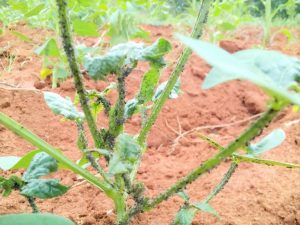[gravityform id=”1″ title=”false” description=”false” ajax=”true”]
Mashariki Television Networks Limited Email: info@themasharikinewspaper.com
Email Us
Our address
Mashariki Communications Centre
Meru-Maua Road
Main Telephone: +254 797 372 837
Postal Address: P. O. Box 747-60200, Meru, KenyaWe are social

Cowpeas crop in Kitui affected by
aphids | PHOTO-Courtesy
By Mukembu Mutethia
Black-looking aphids have invaded farms at Kaunike village in the Mwingi North sub-county of Kitui leaving farmers counting losses. The farmer’s fears are that despite heavy rains that had pounded the area this season, they are staring at a hunger strike due to the invasion where the pests have devoured green grams, cow peas, and beans.
Esther Kyalo, a farmer in the area said “It is so unfortunate that God had blessed us this year with a bumper harvest, but we are not going to harvest as we expected because the insects have eaten our crops.”
Aphids are one of the most important and destructive agriculture pests causing serious economic losses by both nutrient-robbing and transmitting plant viruses.
She said the Aphids seem to be reproducing night and day making it hard to kill them all by spraying.
Due to chemicals being harmful to the environment and humans, expensive, and not readily available, they also have adverse effects on the environment, humans, and non-target organisms if not used properly, farmers started using locally available materials (traditional methods) which are cheaper, environmentally friendly, easily available and less harmful to humans and non-target organisms to mitigate pests.
Similarly, the overuse of pesticides is not just dangerous for your health and the environment; it also wastes money and encourages pest resistance.
“I have been rendered helpless because I have exhausted all the money I had to buy Argo-chemicals. Some of us have even used a mixture of urine and ash to wind out the pests but they are very resistant,” she said.
The farmers anticipated having bumper harvests from drought-resisting Cowpeas and some beans after maize and other slow-growing beans had stunted growth while others withered before maturity.
Julius Maluki decried how they spend most of their time researching on methods to stop them from feeding on their crops.
Maluki pleaded with the county and national government to compensate them.
The infestation in most of the farms has spelled doom on any prospects of having any food yields despite the hard work put in preparation for rains.
Kitui County executive for Agriculture, Stephen Kimwele, told the media that his department was doing everything possible to address the infestation. He said the situation was worse that aphids have been joined by the white fly insects in devouring crops on farms.
“I am asking farms to use the potent pesticides available in local agro vet stores to effectively fight the pests,” Kimwele told a press briefing. The County minister however asked the residents not to consume freshly sprayed farm crops as the chemicals used could be lethal.
Findings by experimental researchers show that chilies and garlic and Peppermint indicate that these plant products have the potential to protect cowpea seeds from cowpea weevils’ damage compared to when the seeds are left or stored unprotected. They should, therefore, be included in pest management strategies for cowpea weevil in grains stored on-farm in rural tropical and subtropical regions.

Comments (0)